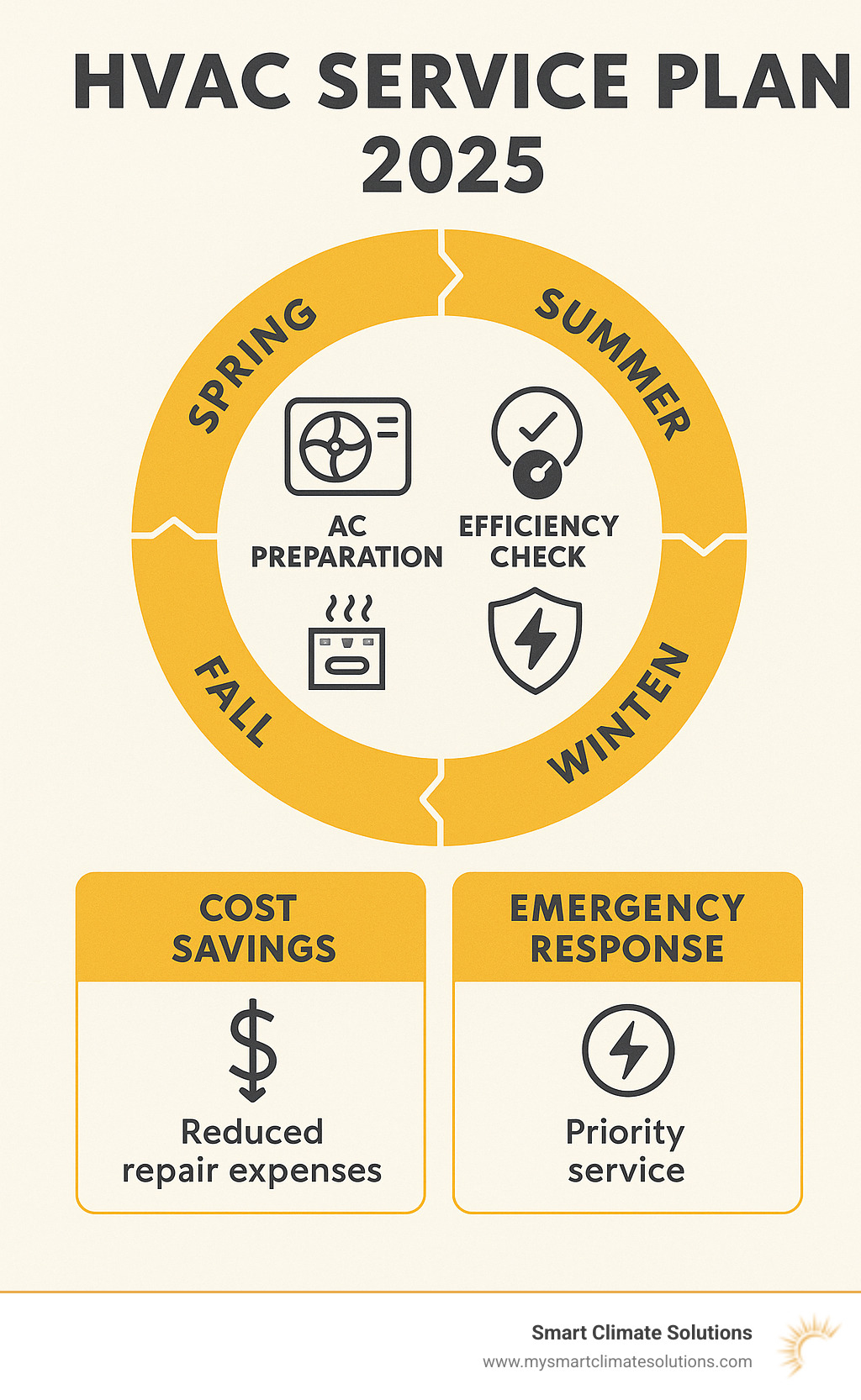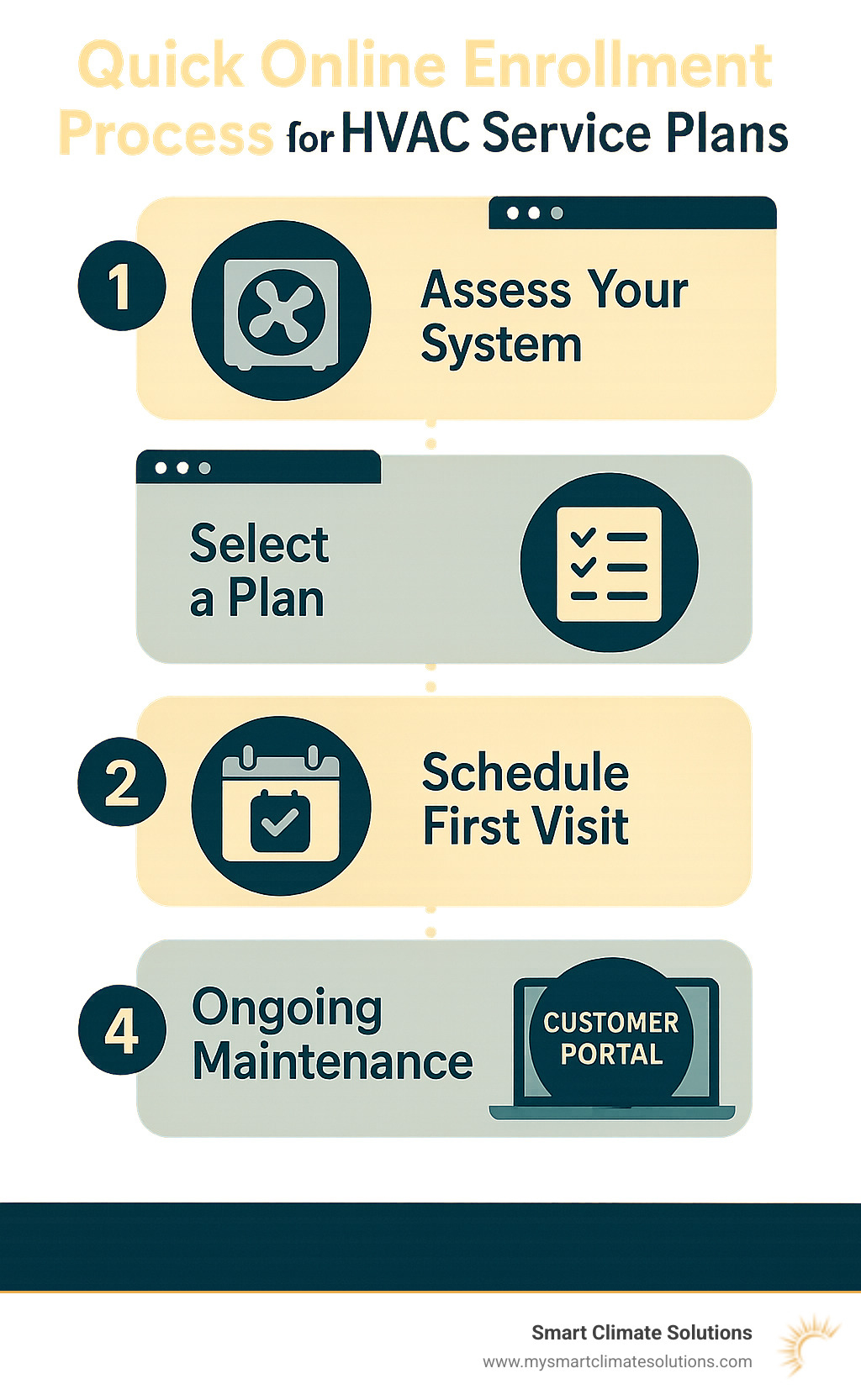Why HVAC Service Plans Are Your Best Defense Against Costly Breakdowns
HVAC service plans are maintenance contracts that keep your heating and cooling systems running efficiently year-round. Here's what you need to know:
What's Included:
- Annual or bi-annual tune-ups - Professional inspections and cleaning
- Priority emergency service - Jump to the front of the line during breakdowns
- Discounted repairs - Save 10-15% on parts and labor
- Extended warranties - Additional protection beyond manufacturer coverage
- Energy savings - Up to 50% reduction in heating and cooling bills
Typical Costs:
- Service plans: $150-$300 annually
- Emergency repairs without plan: $100-$2,000 per incident
Think of it like insurance for your HVAC system. As one industry expert puts it: "Prevention is the best medicine for HVAC systems." Regular maintenance can extend your system's lifespan by up to 15 years and catch small problems before they become expensive disasters.
The bottom line: Service plans cost less than a single major repair and give you peace of mind knowing your home will stay comfortable when you need it most.
I'm Bill Scott, and I've spent over 15 years helping Pittsburgh homeowners steer HVAC service plans and maintenance decisions. At Smart Climate Solutions, we've seen how the right service plan can save families thousands in unexpected repair costs while keeping their homes comfortable year-round.

Related content about hvac service plans:
- ac maintenance plan
- how much are hvac maintenance plans
- preventive maintenance schedule for air conditioner
Snapshot of the Best HVAC Service Plans for Every Home
After two decades of helping Pittsburgh families choose the right HVAC service plans, I've learned that one size definitely doesn't fit all. Your neighbor's perfect plan might be overkill for your situation—or leave you scrambling when your system breaks down at the worst possible moment.
Think of HVAC service plans like choosing a cell phone plan. You wouldn't pay for unlimited data if you're always on WiFi, right? Same logic applies here. Let me walk you through what we've found works best for different types of homeowners.
Starting small makes sense if you're testing the waters or have a brand-new system. Many companies offer complimentary starter plans or low-cost entry options that include one annual visit. You'll get a basic system inspection and cleaning, plus you can see if you like working with that service provider. It's like a first date—no major commitment, but you get to know each other.
Basic plans running $150-$200 annually work well for newer systems under five years old. You'll get one comprehensive annual tune-up, a 10% discount on any repairs, and basic warranty coverage. If your system is still under manufacturer warranty and running smoothly, this level often provides plenty of protection.
Most Pittsburgh homeowners hit the sweet spot with prime plans in the $200-$300 range. These include two seasonal visits—one in spring to prep your AC, another in fall to ready your heating system. You'll also get 15% discounts on repairs and priority scheduling during those crazy hot July days when everyone's AC decides to quit at once. This level works perfectly for systems between 5-10 years old.
Premier plans step up to $300-$425 annually and really shine for older systems or homes that push their HVAC hard. You'll get bi-annual maintenance visits, free diagnostic calls (which normally cost $89+ each), priority emergency service, and up to 15% repair discounts. The comprehensive parts warranty alone can save you hundreds on a single repair.
At the top end, prestige plans starting around $425 annually offer the full treatment. We're talking multiple annual visits, deep cleaning of coils and blower components, remote monitoring capabilities, and lifetime repair warranties. Some even include annual trade-in credits toward new equipment. These plans make sense for commercial properties or high-end residential systems where downtime costs serious money.
DIY filter-only plans deserve a mention too. Some homeowners prefer handling basic maintenance themselves but want emergency-priority add-ons and discounted repairs when problems arise. These hybrid approaches can work if you're handy and consistent about maintenance.
The newest trend we're seeing is predictive monitoring built into higher-tier plans. Smart sensors track your system's performance and alert us to potential problems before they cause breakdowns. It's like having a crystal ball for your HVAC system.

The key is matching your plan to your system's age and your family's comfort needs. In our experience serving the Pittsburgh area, most homeowners get the best value from prime or premier plans, especially given our climate extremes. You need your system working when it's 95 degrees in August and when it's 10 below in January—and that's exactly when everyone else's systems tend to fail too.
HVAC Service Plans 101: What's Inside and Why It Matters
Think of HVAC service plans as your system's personal health insurance. Just like regular doctor visits keep you healthy, these maintenance agreements keep your heating and cooling systems running smoothly year after year.
The numbers speak for themselves. According to the Air Conditioning Contractors of America (ACCA), homeowners with maintenance plans see their energy bills drop by up to 15% and their systems last 25% longer. That's real money back in your pocket.
Here's what makes a quality service plan so valuable: comprehensive tune-ups that clean and calibrate every component, priority queuing that puts you first in line during emergencies, and parts and labor discounts that typically save 10-15% on repairs. Your plan also keeps your warranty validation current and delivers indoor air quality boosts through regular filter changes and system cleaning.
The best part? All these efficiency gains happen automatically. You don't have to remember when to schedule service or worry about whether your system is ready for the next season.
Scientific research on hvac maintenance contracts shows that dirt and neglect cause most HVAC breakdowns. Regular professional maintenance stops these problems before they start.
Homeowners with maintenance plans typically enjoy 50% fewer emergency repairs, 25% longer system life, and up to 15% lower energy bills. When you consider that one emergency repair can cost $500-$2,000, the math is pretty clear.
Typical Task Checklist
A proper maintenance visit should cover every critical component of your system. During each visit, we start with a filter swap and check your air flow patterns. We thoroughly coil rinse both indoor and outdoor units to remove dirt and debris that blocks efficient heat transfer.
Blower calibration ensures your system moves the right amount of air through your home. We conduct a comprehensive safety inspection that includes checking electrical connections, testing for carbon monoxide leaks, and verifying all safety controls work properly.
If your system needs it, we'll perform a refrigerant top-off to maintain proper cooling capacity. Finally, thermostat calibration makes sure your system responds accurately to temperature changes and runs efficiently.
We also inspect your ductwork for leaks, clean condensate drains, remove debris from outdoor units, and test system cycling. Every visit includes energy efficiency assessment and performance optimization.
Our 25-point checklist ensures nothing gets missed. This systematic approach catches 90% of potential problems before they cause expensive breakdowns.
Service Frequency Guidelines
Most homes need at least an annual visit to keep their systems running well. However, we recommend biannual tune-ups in spring and fall for optimal performance and maximum energy savings.
Some situations call for extreme-climate quarterly checks. If you live in an area with harsh winters or blazing summers, or if your system runs constantly, more frequent visits make sense.
Aging-system care becomes especially important as your equipment gets older. Systems under 5 years old typically do fine with annual maintenance. Systems between 5-15 years old benefit from twice-yearly visits. Systems over 15 years old may need quarterly attention to prevent unexpected failures.
Here in Pittsburgh, our climate extremes demand more attention than milder regions. Spring preparation gets your cooling system ready for summer heat. Fall heating system preparation ensures reliable warmth all winter long. Mid-winter safety checks during peak usage give you peace of mind during the coldest months.
More info about Preventive Maintenance Schedule for Air Conditioner provides detailed timing recommendations for our local climate.
The key is matching your maintenance schedule to your system's needs and your family's comfort requirements. We'll help you find the right balance between cost and peace of mind.
How to Pick the Right Plan & Provider
Choosing the right HVAC service plan doesn't have to feel overwhelming. Think of it like picking a family doctor – you want someone reliable, experienced, and available when you need them most.
Your system's age tells the story. If you've got a newer system (under 5 years old), a basic plan usually does the trick. These systems are still in their prime and typically need less attention. But once your system hits that 5-15 year sweet spot, stepping up to a prime or premier plan makes financial sense. And if your trusty old system is pushing 15+ years? That's when comprehensive coverage becomes your best friend.
Usage patterns matter more than you'd think. A vacation home that only gets weekend use has very different needs than a house where someone's always home. Heavy usage means more wear and tear, which translates to more frequent maintenance needs. We've seen systems that run 24/7 benefit enormously from quarterly service visits.
Pittsburgh's climate throws curveballs. Our hot, sticky summers make air conditioners work overtime, while our cold winters demand reliable heating. Those seasonal transitions – when you're switching from heat to AC and back – are when systems often fail. A good service plan prepares your system for these challenges before they become problems.
Budget considerations go beyond the sticker price. Paying $200-300 annually for a service plan feels like an expense. But compare that to a single emergency repair that could cost $1,500 or more. Factor in the energy savings from a well-maintained system, and most homeowners break even within the first year.
Provider reputation separates the wheat from the chaff. Look for contractors with proper licensing, NATE-certified technicians, and solid local references. The ability to provide 24/7 emergency service isn't just nice to have – it's essential when your heat goes out on a January night.
Here's how HVAC service plans stack up against home warranties:
| Feature | Service Plan | Home Warranty |
|---|---|---|
| Preventive Maintenance | Included | Not covered |
| Emergency Response | Priority service | Standard queue |
| Parts Coverage | Discounted | Limited selection |
| Labor Costs | Reduced rates | Fixed deductibles |
| Relationship Building | Same technicians | Random contractors |
| Transparency | Clear pricing | Hidden fees common |
Scientific research on energy savings consistently shows that professional maintenance plans outperform general home warranties for HVAC systems. The difference? Service plans focus on prevention, while warranties only kick in after something breaks.
Key Questions to Ask Before Signing
Before you sign on the dotted line, ask these questions. A good contractor will answer them gladly and thoroughly.
Coverage specifics matter. What exactly happens during each visit? Are both parts and labor covered when repairs are needed? What's the response time guarantee for emergencies? Some companies charge extra for travel or mileage, so ask upfront.
Exclusions can be deal-breakers. Every plan has limits, but some are more reasonable than others. Are there age restrictions on covered equipment? What repairs aren't covered? Are refrigerant charges included or extra? Understanding these limits prevents nasty surprises later.
Contract terms affect your flexibility. How long are you committed? Can you transfer the plan if you sell your home? What happens if you need to cancel? How do price increases work? These details might seem boring now, but they matter when circumstances change.
Service details reveal quality. Who actually does the work? Are technicians certified and insured? How are appointments scheduled? What happens if you're not satisfied with the service? The answers tell you a lot about how the company operates.
Red Flags & Fine Print
Watch out for these common traps that can turn a good deal into a headache.
Auto-renewal clauses can lock you in without warning. Some contracts automatically renew and charge penalties if you try to cancel within the first year. Others raise prices without adequate notice. Always read the renewal terms carefully.
Hidden diagnostic fees defeat the purpose of having a service plan. If you're paying for coverage but still getting charged to figure out what's wrong, that's not a good deal. Emergency calls and after-hours service should be clearly defined in terms of additional costs.
Parts exclusions can be tricky. Some plans exclude "wear items" like filters or have age limits on covered components. Others charge extra for refrigerant, which can be expensive. Make sure you understand what's actually covered.
DIY obligations might void your coverage. Some plans require homeowners to change filters regularly or perform other maintenance tasks. Miss these requirements, and you might find your warranty voided when you need it most.
Unclear visit counts lead to confusion and extra charges. Vague language about service frequency or seasonal restrictions can mean you don't get the service you thought you were paying for. Get specifics in writing.
The bottom line? A reputable provider will explain everything transparently and answer all your questions without pressure. If someone seems evasive or pushy, keep looking. Your comfort and peace of mind are worth finding the right partner.
Dollars and Sense: Pricing & ROI
Let's talk real numbers here. After helping Pittsburgh families with their HVAC needs for over two decades, I've seen how HVAC service plans can either save you money or cost you more than you bargained for. The key is understanding what you're actually getting for your investment.
Annual service plan costs typically range from $150 to $300 for most residential systems. That might sound like a lot upfront, but here's the reality check: a single emergency repair call can easily run you $100 to $2,000 depending on what breaks down.
Just last month, we had a customer whose heat exchanger failed on the coldest day of winter. The replacement cost? $1,200. If they'd had a service plan, we would have caught the early warning signs during routine maintenance and potentially avoided the whole mess. That's the difference between planned maintenance and emergency repairs.
The energy savings alone can make these plans worthwhile. When your system is running efficiently, your energy bills drop significantly. We've documented cases where customers saw energy bill reductions of up to 50% after comprehensive maintenance brought their systems back to peak performance.
Here's what the math looks like for a typical Pittsburgh homeowner. You pay $250 annually for a good service plan. In return, you avoid an average repair cost of $800 and save $200 to $400 on energy bills each year. That's a $750 to $950 benefit in your first year alone.
The break-even timeline is usually six to twelve months. After that, you're looking at pure savings. But the real value shows up over time. A well-maintained system can last up to 15 years longer than a neglected one. That's potentially $5,000 to $10,000 in delayed replacement costs.
Over a ten-year period, our service plan customers typically save $2,000 to $4,000 in avoided repairs, $1,500 to $3,000 in energy costs, and thousands more by extending their system's lifespan. The numbers don't lie.
More info about How Much Are HVAC Maintenance Plans? breaks down the costs for different system types and sizes.
The bottom line? HVAC service plans aren't just about fixing problems—they're about preventing them while keeping more money in your pocket. When you consider the peace of mind that comes with knowing your system won't fail during a heat wave or cold snap, the investment becomes a no-brainer.
Frequently Asked Questions about HVAC Service Plans
What is an HVAC service plan?
An HVAC service plan is basically a friendship agreement between you and your heating and cooling system. Instead of waiting for things to break down (usually at the worst possible moment), you get a qualified contractor to check on your system regularly and keep it running smoothly.
Think of it like taking your car in for regular oil changes, except your HVAC system is a lot more complex and a breakdown in January can be a real emergency. The plan covers scheduled maintenance visits throughout the year, gets you to the front of the line when something goes wrong, and usually saves you money on repairs when they're needed.
What makes these plans different from just calling someone when your furnace quits? It's all about prevention. Your technician gets to know your system, spots problems before they become disasters, and keeps everything running at peak efficiency. Plus, most manufacturers actually require professional maintenance to keep your warranty valid, so a service plan kills two birds with one stone.
How often should my HVAC system be serviced?
Here in Pittsburgh, we see it all - from folks who haven't had their system looked at in five years to others who want monthly check-ups. The sweet spot for most homeowners is twice per year - once in spring before the cooling season kicks in, and once in fall before you need reliable heat.
Why twice? Our climate is tough on HVAC systems. Those hot, humid summers work your air conditioner hard, while our cold winters demand dependable heating. Each season brings different challenges, and your system needs different preparation.
If you're on a tight budget, annual maintenance is the bare minimum. Most manufacturers require at least yearly professional service to maintain warranty coverage. But if you've got an older system or you really can't afford unexpected breakdowns, bi-annual service is worth every penny.
For newer systems under five years old, annual visits often do the trick. But once your system hits that 5-15 year range, twice-yearly attention becomes much more valuable. And if you're running equipment that's 15 years or older? Well, let's just say more frequent care can mean the difference between getting a few more good years and facing an unexpected replacement.
Are HVAC service plans worth the money?
This is the question we get asked most, and I'll give you the straight answer: Yes, absolutely - especially if you live in a climate like ours where your HVAC system works hard year-round.
Let's talk real numbers. Most HVAC service plans cost between $150 and $300 per year. A single major repair? That can easily run $500 to $2,000. Last month, we had a customer whose compressor failed on the hottest day of summer. The replacement cost $1,800. Her annual service plan had already paid for itself six times over.
But the money savings go beyond just avoiding repairs. Regular maintenance keeps your system running efficiently, which can cut your energy bills by 15 to 50 percent. For most Pittsburgh homeowners, that's $200 to $400 in savings every year. The plan literally pays for itself through lower utility bills.
Here's what really convinced me about service plans: peace of mind. When you've got a relationship with a trusted contractor, you're not scrambling to find someone reliable at 2 AM when your heat goes out. You're not worried about whether your family will be comfortable during the next polar vortex or heat wave.
The families who benefit most are those with young kids, elderly family members, or anyone who simply can't handle the stress and expense of unexpected breakdowns. If a $300 annual investment saves you from a $2,000 surprise repair bill, that's not just smart money management - that's protecting your family's comfort and your peace of mind.
Conclusion
Your home's comfort shouldn't be left to chance. HVAC service plans give you the peace of mind that comes from knowing your heating and cooling systems are in expert hands, protecting you from those dreaded middle-of-the-night breakdowns when you need your system most.
We've seen it countless times over our two decades of experience - families who invest in regular maintenance avoid the stress, expense, and discomfort of emergency repairs. Whether you choose a basic annual plan or comprehensive coverage, you're making a smart decision that pays dividends in comfort, savings, and reliability.
At Smart Climate Solutions, we've built our reputation on delivering comfort without compromise to families across Pittsburgh, South Hills, Washington PA, and throughout Western Pennsylvania. Our certified technicians understand the unique challenges of our climate - from sweltering summer humidity to bone-chilling winter cold - and we're here for you with 24/7 emergency support when you need it most.
What sets us apart isn't just our technical expertise, though that matters. It's our commitment to treating your home like our own and your family like ours. We take the time to understand your specific needs, whether you're protecting a brand-new system or helping an older one run efficiently for years to come.
The best part? Getting started is easier than you might think. We've streamlined our enrollment process so you can have protection in place quickly, without hassle or confusion. Our flexible HVAC service plans are designed around real families' needs and budgets, not complicated corporate structures.
Don't wait for that first major breakdown to wish you'd acted sooner. The families who call us after their system fails always say the same thing: "I wish I'd done this years ago." You can be smarter than that.
Ready to protect your comfort and your wallet? More info about Services - we're here to help you find the perfect plan for your home.

Your family deserves reliable heating and cooling, and your budget deserves protection from unexpected repair costs. With the right service plan and trusted professionals on your side, you can enjoy both - and that's a promise we've kept for over 15 years.





.avif)
.avif)
.png)
